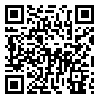Volume 4, Issue 1 (5-2022)
Int. J. Ethics Soc 2022, 4(1): 52-59 |
Back to browse issues page
1- Ph.D. Student in Psychology, Ahvaz Branch, Islamic Azad University, Ahvaz, Iran
2- Dept. of Psychology, Ahvaz Branch, Islamic Azad University, Ahvaz, Iran , dutism16@gmail.com
3- Dept. of Psychology, Ahvaz Branch, Islamic Azad University, Ahvaz, Iran
2- Dept. of Psychology, Ahvaz Branch, Islamic Azad University, Ahvaz, Iran , dutism16@gmail.com
3- Dept. of Psychology, Ahvaz Branch, Islamic Azad University, Ahvaz, Iran
Abstract: (916 Views)
Background: The aim of this study was to evaluate the effectiveness of motivational models on creativity and self-worth and commitment to school as ethical factors in female high school students in Ahvaz.
Method: The type of research was based on the purpose of the experimental field research method of pre-test and post-test design with a control group. The statistical population of this study includes all female high school students in Ahvaz who were studying in the 99-98 academic year. The sampling method was multi-stage. One hundred twenty participants were selected as a sample group. Data collection tool included a questionnaire. Finally, the data were analyzed by multivariate analysis of covariance.
Results: The results showed that the differences between the group of motivational models and the control group were 41.67 in self-worth, 9.94 in commitment to school and 11.34 in creativity, which were significant at all levels of 0.005.
Conclusion: Based on the findings of the present study, it can be inferred that intervention programs related to motivational patterns can lead to increased levels of creativity, as well as ethical components such as a sense of self-worth and self-importance and commitment to the school.
Method: The type of research was based on the purpose of the experimental field research method of pre-test and post-test design with a control group. The statistical population of this study includes all female high school students in Ahvaz who were studying in the 99-98 academic year. The sampling method was multi-stage. One hundred twenty participants were selected as a sample group. Data collection tool included a questionnaire. Finally, the data were analyzed by multivariate analysis of covariance.
Results: The results showed that the differences between the group of motivational models and the control group were 41.67 in self-worth, 9.94 in commitment to school and 11.34 in creativity, which were significant at all levels of 0.005.
Conclusion: Based on the findings of the present study, it can be inferred that intervention programs related to motivational patterns can lead to increased levels of creativity, as well as ethical components such as a sense of self-worth and self-importance and commitment to the school.
Article number: 7
Type of Study: Research |
Subject:
Special
Received: 2021/07/22 | Accepted: 2021/08/16 | Published: 2022/05/29
Received: 2021/07/22 | Accepted: 2021/08/16 | Published: 2022/05/29
| Rights and permissions | |
 |
This work is licensed under a Creative Commons Attribution 4.0 International License. |





